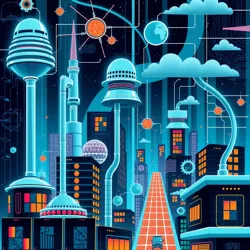Humanity's Relationship with Technology
The relationship between humanity and technology has been a central theme in literature, art, and philosophy for centuries. This complex interaction explores how technological advancements shape human society, influence cultural norms, and impact individual identity. From early inventions to modern-day digital innovations, technology continually redefines what it means to be human.
Historical Context
Throughout history, technological progress has been both celebrated and feared. The Industrial Revolution marked a significant turning point, introducing machines that transformed industries and societies. This period also gave rise to a myriad of literary and artistic explorations of technology's role in human life, often reflecting concerns about mechanization and the loss of personal autonomy.
Themes in Literature
In literature, technology is frequently depicted as a double-edged sword, offering both promise and peril. Authors use technological themes to address issues of identity, ethics, and the future of humanity.
The Prometheus Myth
The myth of Prometheus, who stole fire from the gods to give to humanity, is often used as an allegory for technological advancement. This tale symbolizes the potential of technology to empower humanity, as well as the potential consequences of overreaching.
Utopia and Dystopia
Many literary works examine technology's role in creating utopian or dystopian societies. In utopian narratives, technology is portrayed as a force for good, enhancing human capabilities and fostering social harmony. In contrast, dystopian stories often depict technology as a tool of oppression, exacerbating societal inequalities and eroding individual freedoms.
Impact on Society
Technology's influence extends beyond literature, affecting every aspect of human life. From communication to healthcare, technological innovations have reshaped how people interact with the world and each other.
Communication and Connection
The advent of digital communication technologies, such as the internet and social media, has revolutionized how people connect. These platforms enable instantaneous communication across the globe but also raise questions about privacy, information overload, and the authenticity of online interactions.
Ethical Considerations
As technology continues to advance, ethical considerations become increasingly important. The development of artificial intelligence, biotechnology, and other emerging fields prompts debates about the moral implications of creating and using such technologies.

Future Perspectives
Looking ahead, the relationship between humanity and technology is likely to grow even more intertwined. Innovations such as the Neural Nexus promise to blur the lines between human cognition and machine intelligence, offering new possibilities for human enhancement and interaction.
See Also
- Techno-Organic Art: Exploring the fusion of technology and nature in contemporary art.
- Cyborg Anthropology: The study of human-technology interactions through an anthropological lens.
- Digital Ethics: An examination of moral questions in the digital age.
References
- Chronicles of the Machine Age: A comprehensive history of technological advancements and their societal impact.
- The Human-Machine Interface: Investigating the psychological effects of technology on human behavior.
- Future Frontiers: A series of essays on the potential trajectories of technological evolution.